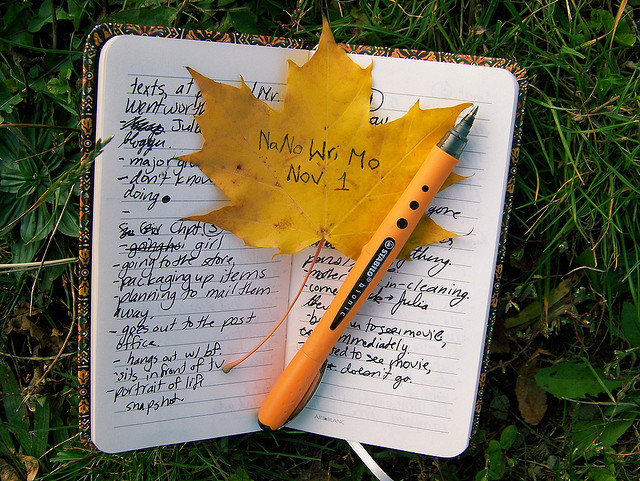A few months ago (eternity in blogging time), I came up with the idea to write about how to become a better writer. Then I let it gather dust instead of actually writing about it. And then yesterday, I realized that I’ve written 365 articles in the past 1 year and 4 months.
Estimating just 500 words per article (most of my long-form pieces are 800-1000, but recipes and fitness tutorials bring down the average), I have written around 182,500 words–in other words, two long novels! Then there are 150 words for the daily inspirational newsletter (6x a week), adding another 34,200 words (a novella!). Actually thinking about it in these terms really surprised me as well. Of course, writing a novel with its own internal logic and life is different than writing so many blog posts about smaller pieces of life. I’m not saying that writing for PD is at all even at the same level as penning a great literary masterpiece. But still, if someone were to say to me a year ago that I’d write so many words (just sheer volume of it), as many as in Crime and Punishment, actually, I’d not have believed it. Plus, blogging comes with its own set of challenges, like having very close deadlines everyday (seriously man), and being interesting all the time. (I’ll faithfully trudge through a boring 50-page stretch of a novel, but one dud of a blog post and I’m clicking Back.) So kudos to all writers! 🙂
Very often readers ask me how I find my inspiration or how I keep writing day after day, and the truth is that anyone can become a better writer. So without further ado, here are tips on becoming more creative, consistent, prolific, and inspired.
1. Get inspiration everywhere.
In order to keep writing I have to be constantly on the lookout for the next inspiration. Be actively thinking about your writing at all times: whatever happens to you, any stories you hear, books you read, art you see, the news–anything with which you come into contact is material for your story. And keep your heart and mind open so these stimuli *touch* you in some way–otherwise you’ll just be repeating the thing, and not creating anything.
“Every story, every incident, every bit of conversation is raw material for me.” –Sylvia Plath
2. Find what matters to you.
The best kind of writing is the one that matters to you. Why is this important for you to talk about? If you can’t say why–drop it and go back to the drawing board, because if your heart is not in the story, it won’t ring true to anyone else either. Sometimes you’ll read something by an author who is trying to say something about our culture or society or the times–and it rings more hollow than real because there is no true personal conviction there. Make it personal, be authentic.
“Write hard and clear about what hurts.” — Ernest Hemingway
3. Writer’s block: Don’t waste time thinking about how tough it is to write and just start writing.
Every morning I go to my favorite cafe, order an Americano, and sit at a table to start writing the daily newsletter. It’s just 150 words a day but boy, is it challenging to say something fresh, true, and inspiring 6 times a week for months on end. Sometimes it just happens quickly and effortlessly, and other times I sit there for 2 hours, trying this and that, writing and erasing. The secret is just in not giving up until you come up with something good and worthwhile. I never think, “oh, the day has finally come, I’ve now completely run out of ideas.” There is always something to write about, and a better way to say it. So no excuses and just do it.
4. Say it in less words.
Be simple. Learn from Hemingway and abandon adjectives. The best way to write is to say precisely what you mean, no more no less. Don’t use words as baroque adornments to phrases.
5. Empathy.
The key to great writing–whether it’s fiction or non fiction, novel or blogging–is empathy: empathy for the character, for the narrator (which may be the author), or from the author to the reader. It’s not just about being likable, but about finding common humanity. You need to open up and let your soul come out.
6. Revise, revise.
You’re never done writing. There is always room for improvement. Don’t fall in love with any sentence so much that you would be unwilling to revise it and make it more absolute, pure, and essential.
7. Keep writing.
So you want to be a writer. Then make writing a part of your deal just like healthy eating, running, yoga, or what have you. Yes, you’re busy and overworked, and when you come home, you have to cook and clean and fall asleep just to do it all over again. But you sit yourself down at your desk after everyone else falls asleep, and there is glory in that.
“Time is short, my strength is limited, the office is a horror, the apartment is noisy, and if a pleasant, straight-forward life is not possible then one must try to wriggle through by subtle maneuvers.” –Franz Kafka
If Kafka could work as an insurance agent and write at night and pen some of the most perfect stories ever written, and Faulkner could produce As I Lay Dying while working the night shift at a power plant, then you certain can also make room and time in your life for creative work. Here is the truth: There is no other way to be a writer than to be constantly writing, whether that’s being published by Knopf or Peaceful Dumpling or just staying in your diary for posterity. 🙂
What are some of your own writing tips? What do you struggle with the most? And is anyone doing the National Novel Writing Month?
Related: The Best Writing Tip I Ever Received
How to Become a Successful Blogger
__
Photo: A L via Flickr





